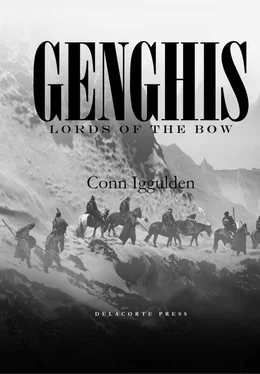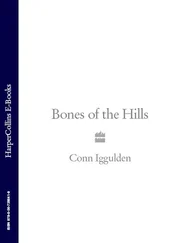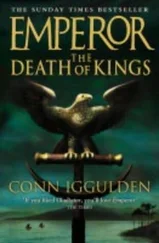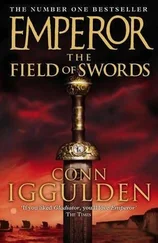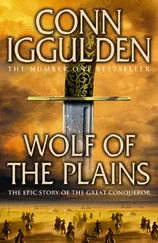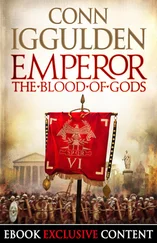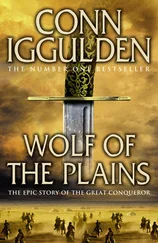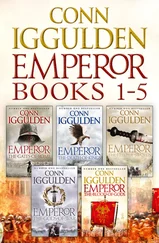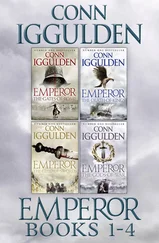Conn Iggulden - Lords of the Bow
Здесь есть возможность читать онлайн «Conn Iggulden - Lords of the Bow» — ознакомительный отрывок электронной книги совершенно бесплатно, а после прочтения отрывка купить полную версию. В некоторых случаях можно слушать аудио, скачать через торрент в формате fb2 и присутствует краткое содержание. Жанр: Исторические приключения, на английском языке. Описание произведения, (предисловие) а так же отзывы посетителей доступны на портале библиотеки ЛибКат.
- Название:Lords of the Bow
- Автор:
- Жанр:
- Год:неизвестен
- ISBN:нет данных
- Рейтинг книги:5 / 5. Голосов: 1
-
Избранное:Добавить в избранное
- Отзывы:
-
Ваша оценка:
- 100
- 1
- 2
- 3
- 4
- 5
Lords of the Bow: краткое содержание, описание и аннотация
Предлагаем к чтению аннотацию, описание, краткое содержание или предисловие (зависит от того, что написал сам автор книги «Lords of the Bow»). Если вы не нашли необходимую информацию о книге — напишите в комментариях, мы постараемся отыскать её.
Lords of the Bow — читать онлайн ознакомительный отрывок
Ниже представлен текст книги, разбитый по страницам. Система сохранения места последней прочитанной страницы, позволяет с удобством читать онлайн бесплатно книгу «Lords of the Bow», без необходимости каждый раз заново искать на чём Вы остановились. Поставьте закладку, и сможете в любой момент перейти на страницу, на которой закончили чтение.
Интервал:
Закладка:
That all men would be tyrants if they could.
– DANIEL DEFOE
The birthdate of Genghis can only ever be estimated. Given the nomadic nature of the Mongol tribes, the year and location of his birth were never marked. In addition, small tribes would record the years in terms of local events, making it hard to match to calendars of the day. It is only when Genghis comes into contact with the larger world that the dates are known with any certainty. He invaded the Xi Xia region south of the Gobi in 1206 A.D. and was proclaimed khan of all the tribes in the same year. In the Chinese calendars, that was the year of Fire and of the Tiger, at the end of the Taihe era. He may have been as young as twenty-five or as old as thirty-eight when he united his people. I have not dwelled on the years of war and alliances as he slowly brought the great tribes together under his command. Interesting as that was, his story always had a wider scope. I recommend The Secret History of the Mongols, translated by Arthur Waley, for anyone wishing to know more of that period.
The Naiman alliance was the last major coalition to resist being swept up into the new nation. The khan of the Naimans did climb Mount Nakhu, moving further and further up the slopes as the army of Genghis advanced. Genghis offered to spare his bondsmen, but they refused and he had them killed to the last man. The rest of the warriors and families were absorbed into his own forces.
Kokchu was a powerful shaman, also known as Teb-Tenggeri. Little is known of exactly how he became influential. Both Hoelun and Borte complained to Genghis about him at various points. His ability to influence Genghis became a great source of concern for those around the khan. Genghis himself believed in a single sky father: deism supported by the spirit world of shamanism. Kokchu remains something of an enigma. One law of the tribes was that it was forbidden to shed royal blood or that of holy men. I have not yet finished telling his story.
As the tribes gathered to Genghis's call, the khan of the Uighurs wrote a declaration of loyalty almost exactly as I have it here. However, the incident of Khasar being beaten and Temuge forced to kneel involved sons of the Khongkhotan clan rather than the Woyela.
Genghis did flood the plain of the Xi Xia and was forced to retreat before the rising waters. Although it must have been embarrassing, the destruction of the crops brought the king to the negotiating table and eventually won a vassal for the Mongol people. It would not have been Genghis's first encounter with the idea of paying tribute. Mongol tribes were known to negotiate in this way, though never on this scale. It is interesting to consider what Genghis must have made of the riches of the Xi Xia and, later, the emperor's own city. He had no use for personal possessions beyond those he could carry on his horse. Tribute would have impressed the tribes and signaled his dominance, but otherwise had very little practical use.
The outcome for the Xi Xia might have been different if Prince Wei of the Chin empire had answered the call for aid. His message (in translation) was: "It is to our advantage when our enemies attack one another. Wherein lies the danger to us?"
When Genghis went round the Great Wall of China, he did so only by accident. His path to Yenking through Xi Xia lands neatly circumvented the wall. However, it is important to understand that the wall was a solid obstacle only in the mountains around Yenking-later known as Peking, then Beijing today. In other places, the wall was broken, or no more than a rampart of earth with an occasional guard post. In later centuries, the wall was joined into one continuous barrier to invasion.
It is worth noting that the Western pronunciation of Chinese place-names is always an approximation, using an alien alphabet to create the same sound. Thus, Xi Xia is sometimes rendered as Tsi-Tsia, or Hsi-Hsia, and Chin is sometimes written as Jin or even Kin. Sung is written as Song in some texts. I have managed to find twenty-one spellings of Genghis, from the exotic Gentchiscan and Tchen-Kis to the more prosaic Jingis, Chinggis, Jengiz, and Gengis. The Mongolian word ordo or ordu means camp or general headquarters. From this we derive the word horde. Some dictionaries give the word shaman as a word of Mongolian origin, and the Gurkhas of Nepal could well derive their name from Gurkhan, or khan of khans.
Genghis had four legitimate sons. As with all Mongol names, there are differences in spelling, much as the word Shakespeare is occasionally written as Shaksper, or Boadicea as Boudicca. Jochi is sometimes seen as Juji, Chagatai as Jagatai, Ogedai as Ogdai. His last son was Tolui, sometimes written as Tule.
As well as the Xi Xia princess, Genghis often accepted wives from his beaten enemies. One of his later decrees made all Mongol children legitimate, though the ruling did not seem to affect the right to inherit among his own sons.
Walled cities were always a problem for Genghis. At the time of his attack on Yenking, that city was surrounded by fortress villages containing granaries and an arsenal. There were moats around the city walls and the walls themselves were almost fifty feet thick at the base, rising as high. The city had thirteen well-constructed gates and what is still the longest canal in the world, stretching more than a thousand miles south and east to Hangzhou. Most of the world's capital cities have their beginnings on the shores of a great river. Beijing was built around three great lakes-Beihei to the north, Zhonghai (or Songhai) in the center, and Nanhai to the south. It may well be the oldest continuously occupied human settlement, as evidence of inhabitants has been found from nearly half a million years ago-Peking Man, as he is sometimes known.
At the time of Genghis's attack through the pass of the Badger's Mouth, Yenking had undergone a period of growth that resulted in walls five miles in circumference and a population of a quarter of a million households, or approximately a million people. It is possible to imagine as many as half a million more who would not show up on any official count. Even then, the famous "Forbidden City" within the walls and the emperor's Summer Palace (destroyed by British and French soldiers in 1860) had not yet been built. Today, the city has a population of approximately fifteen million people, and it is possible to drive through the pass that was once host to one of the bloodiest battles in history. That too is a known date: 1211 A.D. Genghis had been leader of his people for five years at that point. He was in the prime of his physical strength and fought with his men. It is unlikely that he was much older than forty, but he may have been as young as thirty, as I have written here.
The battle of Badger's Mouth pass is regarded as one of Genghis's greatest victories. Vastly outnumbered and unable to maneuver, he sent men to flank the enemy, climbing mountains the Chin thought were impassable. The Chin cavalry were routed back into their own lines by the Mongol horse, and even ten years later, skeletons littered the ground around that place for thirty miles. With the usual problems of anglicized pronunciation, the pass is known in earlier works as Yuhung, which roughly translates as "Badger."
Having lost the battle, General Zhi Zhong did indeed return and slay the young emperor, appointing another while he ruled as regent.
The city of Yenking was made to be impregnable and there were almost a thousand guard towers on the walls. Each one was defended by enormous crossbows that could fire a huge arrow two-thirds of a mile. In addition, they had trebuchet catapults capable of firing heavy loads for hundreds of yards over the walls. They had gunpowder and were just beginning to use it in war, though at this time it would have formed part of the defenses. Their catapults could have launched clay pots filled with distilled oil-petrol. Assaulting such a city fortress would have broken the back of the Mongol army, so they chose to devastate the country around it and starve Yenking to surrender.
Читать дальшеИнтервал:
Закладка:
Похожие книги на «Lords of the Bow»
Представляем Вашему вниманию похожие книги на «Lords of the Bow» списком для выбора. Мы отобрали схожую по названию и смыслу литературу в надежде предоставить читателям больше вариантов отыскать новые, интересные, ещё непрочитанные произведения.
Обсуждение, отзывы о книге «Lords of the Bow» и просто собственные мнения читателей. Оставьте ваши комментарии, напишите, что Вы думаете о произведении, его смысле или главных героях. Укажите что конкретно понравилось, а что нет, и почему Вы так считаете.
